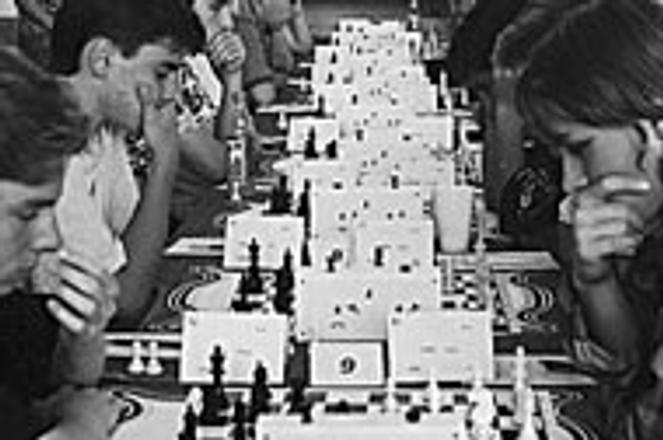The Mecca of chess. Young minds at work in Rimavská Sobota.Robin Blasberg
RIMAVSKÁ SOBOTA - For almost a century, one struggling south-central Slovak town has been building its name on a royal intellectual game: chess. Gasping under the weight of 25 percent unemployment - the nation's worst - Rimavská Sobota has gained recognition as a purveyor of the cerebral board game of queens and kings thanks to the local chess club. "Our town is called the Mecca of chess," Ján Keleti declared in his opening address to the approximately 700 coaches, players and spectators who gathered July 17-27 for the 1996 Junior European Chess Championships.
Rimavská Sobota's chess club greeted the news that its city had been chosen to host the nine-day tournament with excitement. "I want Rimavská Sobota to mean something important in the world of chess," remarked 13-year-old member Miriam Keleti.
It already does. Dating back to 1901, when Slovakia's first chess club was founded in the region, Rimavská Sobota's tradition has prospered over the years. Building upon a cornerstone set when local residents organized Slovakia's first tournament, Rimavská Sobota has hosted numerous chess events, including three Czechoslovak Champion-ships and the 1992 Junior European Chess Championships.
Now, local organizers are looking to the game's future. On May 26, the Rimavská Sobota club commemorated 95 years of organized chess by staging a high-tech competition between the Slovak and Czech Republics. Club members packed the town's House of Culture and squared off against their Prague opponents in 90 simultaneous games over the Internet, a record number likely to be listed in the Guinness Book of World Records.
Back to more conventional means in late July, 423 players from the International Chess Federation's (FIDE) European zone vied for the title of FIDE Master and the right to compete in the Junior World Championships later this year, engaging in games sometimes lasting up to seven hours. While stressed coaches and parents paced in the lobby or strained to watch from the sidelines, youngsters ranging in age from 8 to 18 clasped their heads in their hands and focused intently on their chessboards. As the hours passed, players from all gender and age groups left the floor weeping following bitter defeats, but instantly met comforting arms and reassuring words.
The former Soviet states dominated the tournament. Eight of the 10 first place finishers were from the former USSR. Just as telling, six of the seven competitors from the Israeli team had originally emigrated from the former Soviet Union. A legacy of the socialist system that actively supported chess schools, chess in this new era is still highly regarded as an important tool for developing a strong mind. "Chess is the number one sport in Russia," said Nikolai Andrianov, a former Soviet champion who now coaches the Greek team. "Even Lenin and Stalin played chess."
As the tournament's hosts, Slovak players benefited from the unique opportunity. While most of the 35 other countries qualified either one or two players, mostly national champions, in each of the 10 gender and age categories, Slovakia brought 40 participants to the competition. In particular, Rimavská Sobota's chess club received a tremendous boost when six local players were admitted to the tournament.
XXXNot limited to the seasoned players, grand ambitions for the game enrapture the smallest. Alexander Areshtchenko, a 10-year-old Ukrainian who practices six hours a day, proudly proclaims, "I want to be chess master of the world." One precocious 10-year-old, Grigorii Barashianth from Moldova, had other reasons. "I wanted to travel," he said.
Perhaps a more consensus explanation for why these youngsters choose to practice 30 hours a week was offered by a 12-year-old, gold-medal winning Ukrainian prodigy, who opted to compete with older rivals in the boys 18 and under division. "I fell in love with chess," Riceland Ponomariov said. "I have a passion for the game."
Author: Robin Blasberg


